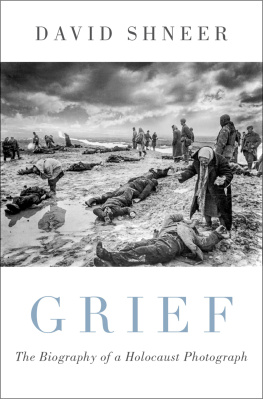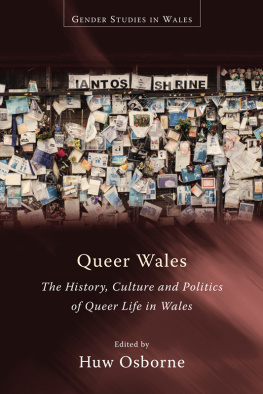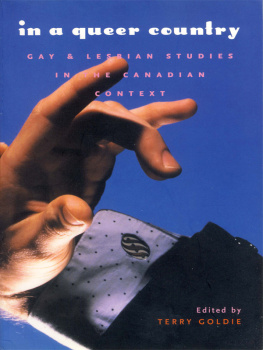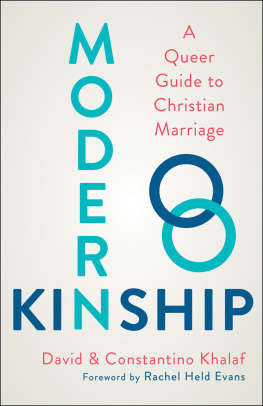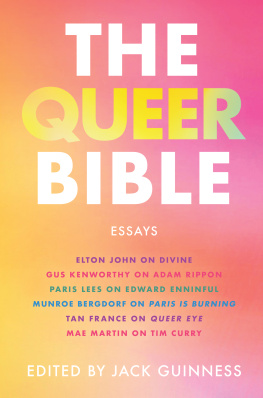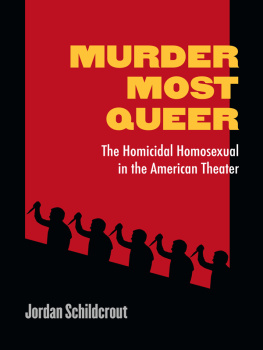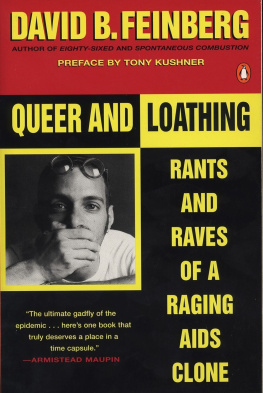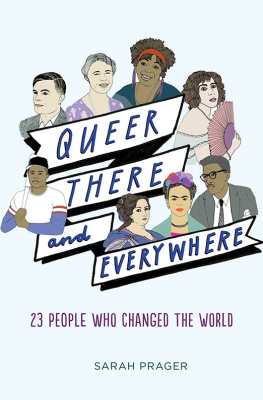American Queer, Now and Then
And you shall not lie with a male as with a woman. It is an abomination.
Leviticus 18:20
When we say the Pledge of Allegiance, we say with liberty and justice for all. Well, what part of all dont people understand?
Former U.S. Representative Patricia Schroeder
Never be bullied into silence. Never allow yourself to be made a victim. Accept no ones definition of your life. Define yourself.
Harvey Fierstein
If you are trying to transform a brutalized society into one where people can live in dignity and hope, you begin with the empowering of the most powerless. You build from the ground up.
Adrienne Rich
American Queer, Now and Then
Edited by
DAVID SHNEER
AND CARYN AVIV
First published 2006 by Paradigm Publishers
Published 2016 by Routledge
2 Park Square, Milton Park, Abingdon, Oxon OX14 4RN
711 Third Avenue, New York, NY 10017, USA
Routledge is an imprint of the Taylor & Francis Group, an informa business
Copyright 2006, Taylor & Francis.
All rights reserved. No part of this book may be reprinted or reproduced or utilised in any form or by any electronic, mechanical, or other means, now known or hereafter invented, including photocopying and recording, or in any information storage or retrieval system, without permission in writing from the publishers.
Notice:
Product or corporate names may be trademarks or registered trademarks, and are used only for identification and explanation without intent to infringe.
Library of Congress Cataloging-in-Publication Data
American queer, now and then / edited by David Shneer
and Caryn Aviv.
p. cm.
Includes bibliographical references and index.
ISBN 13: 978-1-59451-171-4 (hc)ISBN 978-1-59451-172-1 (pbk.)
ISBN 1-59451-171-3 (hc)ISBN 1-59451-172-1 (pbk.)
1. HomosexualityUnited States. 2. GaysUnited States. 3. Gay rightsUnited States. 4. Gay liberation movementUnited States. 5. HomophobiaUnited States. I. Shneer, David, 1972II. Aviv, Caryn, 1969
HQ76.3.U5A46 2006
306.76'60973dc22
2005030857
Designed and Typeset by Hoffman-Paulson Associates
ISBN 13: 978-1-59451-171-4 (hbk)
ISBN 13: 978-1-59451-172-1 (pbk)
Contents
, Audre Lorde
, Alfred C. Kinsey, Wardell B. Pomeroy, and Clyde E. Martin
, George Chauncey
, George Henry
, Loren Cameron
, Kate Bornstein
, Elizabeth Lapovsky Kennedy and Madeline Davis
Wayne Myslik
, Bonnie J. Morris
, William G. Hawkeswood and Alex W. Costley
, Richard Bruce Nugent
, Christi Cassidy
, Michael Callen
, Dossie Easton and Catherine A. Liszt
, Dwight A. McBride
, Dan Savage
, Suzanna Danuta Walters
, Judith Stacey and Elizabeth Davenport
, Daniel Gross and Steven Goldstein
, Chief Justice Margaret Marshall
, Radclyffe Hall
, Tony Kushner
, Suzanna Danuta Walters
, Leslie Feinberg
, Moiss Kaufman
, Valerie Jenness
, Justice Anthony Kennedy
, Henry Gerber
, Mary Casal
, Daughters of Bilitis
, Radicalesbians
, Barbara Smith
, AIDS Coalition to Unleash Power (ACT UP)
, Josh Gamson
, David Shneer and Caryn Aviv
queer [adj]: 1. differing from what is usual or ordinary; odd; singular; strange 2. slightly ill 3. doubtful; suspicious 4. mentally unbalanced 5. counterfeit; not genuine 6. homosexual: in general usage, still chiefly a slang term of contempt or derision, but lately used by some academics and homosexual activists as a descriptive term without negative connotations
On the publication of our first book that involved queers in America, Queer Jews, Caryns very proper, seventy-something Aunt Barbara from Skokie, Illinois, harangued her publicly at a Thanksgiving dinner: Caryn, I love the book, but did you have to use the word (in a slight whisper) queer??!! David has heard similar complaints about the use of such a naughty word from people ranging from his family members to administrators at his university who had issues with that word in a course called Queer in America. Who would take such a course? one perplexed administrator worried.
Words have power. How people have referred to queers over the past 100 years has depended on how people defined queerness. Think of the following images: Fucking faggot! hurled as an epithet by drunken men from a passing car; homo-sex-ual, spoken in a genteel Boston Brahmin accent by a 1920s sexologist; GLBT wait, are there more letters now? earnestly spoken by a straight ally. None of these are unusual scenes to imagine. How queers have referred to themselves can be even more difficult to keep up with. Do you identify as genderqueer, butch dyke, power bottom, flaming queen, or straight-acting?
Although the word makes some people shudder, especially those raised in the 1940s, 1950s, and 1960s, for whom the word has been used as a form of violence against them, queer was, once upon a time in America, the playful insider term for people who were that way. Queers started using the word in the early twentieth century to talk about themselves, to define a group of people who had something in common that was different from the norm.
Since the late 1980s, the term has come back into vogue with a vengeance. For some scholars, activists, and writers, queer marks an area of theory and way of looking at the world. Queer theory encourages people to look at things differently, invites readers to pick up on subtle cues, unpack hidden messages, and make texts more complicated. Others have taken the word queer as an identity label and a politics, a way of making an epithet yelled at someone on the playground into a word that screams Were different, thats good, and if you dont like it, thats your problem.
Some younger Americans use queer to mark themselves as different not just from straights around them, but also from earlier generations of gay men and lesbians. In fact, some queers do not even identify as gay or lesbian, as they see these terms as too confining. Queerness has been about difference, about not being normal, about exploding the very idea of normal, of reading texts, people, and experiences more subtly, flexibly, and creatively. A colleague who teaches queer studies once asked the students to describe a world in which queerness was squelched, suppressed, or eliminated, and students responded, It would be a gray world. It would be a joyless world. It would be a world without Oscar Wilde or Gertrude Stein. It would be a world without pink and sequins. It would be a world without me.
Before we go too far in romanticizing queerness as the life force that animates our social world, a word of caution: in some quarters, the word queer has become so popular that it has become commercial, so commercial in fact that it has lost some of the edge it once had. The cable network Showtime aired a wildly popular show called




